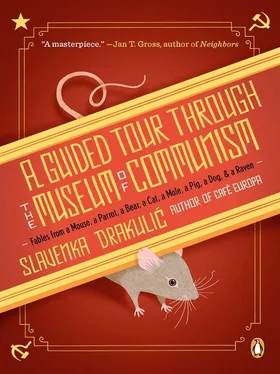Gorby was, no doubt, a believer. The General was a believer, too. “A faith is not acquired by reasoning… Reason may defend an act of faith—but only after the act has been committed, and the man committed to the act,” wrote Arthur Koestler. I think that for the General—as for many other believers—the main problem was the difference between theory and practice: Obviously, for him, in theory Communism looks good. So let us suppose, for the sake of argument, that you are a true Communist (you acquired a faith) who early enough became aware of the “deviations” in practice. You are part of the power structure. You think that you could do better. What do you do? You reach for, shall we say, unethical means in order to achieve your aim. You act brutally in order to save your beloved Poland from the invasion, in accordance with the principle of the end justifying the means. That is, you make a pact with the devil, in this case, Moscow. But—and this is not an excuse, only a clarification—you act as a man of faith. Later on you understand what the consequences of what you have done are and you regret it—only, it is too late. Can you be redeemed? Do you deserve pity? Well, that depends upon the circumstances, I suppose you would say.
In both my feline—that is, subjective—and professional views, the General is perhaps an even more tragic person than Gorbachev. He lost the battle to improve Communism by ruthless means and destroyed his moral credibility , which was not the case with Gorbachev. The General is tragic for another reason, too: because he has admitted publicly that he was defeated. He claims that he believes Communism failed, that he is now a social democrat, and, moreover, that he likes Poland as it is today. Yet, he has never repented for martial law ! He has never admitted that his decision to impose it was wrong. On the contrary, he still maintains that it was a necessary measure to save Poland… In other words, the General did not do the single, most important thing that would have saved him from being put on trial: He did not repent for his decision. And that is unforgivable—at least for half of the Polish citizens. He is not to be forgiven for standing up for his belief. He has to pay for his sins!
This attitude, in the time of a moral decay, is, you have to admit, rather brave, I’d say.
Napoleon comments, “Your justice in just a few words: an eye for an eye.” Being a cat, I don’t trust dogs, and I can’t believe in such primitivism on the part of democratic Poland. Please, Sir! I am aware that I sound pathetic now, but the General must be given a chance to redeem himself. In your religion, everyone must be given this chance. You must have considered whether there is something to say in his defense. Correct me if I am wrong, but it was the General who made possible the first free elections that Solidarity won. You could claim that, in a way, he was forced to the roundtable talks in the spring of 1989—or to invite Solidarity to enter the coalition government. He also stepped down from the presidency. The General considers Solidarity’s later triumph to have been made possible by the decisions he made during and after the imposition of martial law.
However, something like a Solidarity-generation complex still runs very deep in this society. I mean that participants in the roundtable negotiations with the General are themselves being treated as traitors. Politics is the art of compromise, and compromise (enabled by the General) brought about the change of power. Yet political compromise, dialogue, and consensus—even if they played a great role in the nineties—are not sufficiently part of this culture. This is not difficult to understand in view of the past: What could you humans learn about compromise when you were living in a totalitarian society? But this complicates the case of the General even more…
I know, Mr. Prosecutor, that justice is needed, but I ask you: What is justice in the case of the General? Going back to where I started: Does he really have to be tried in a criminal court like an ordinary criminal or Mafioso? Are you sure that this trial will satisfy the principle of justice? Some authorities in the field of law, for example, have expressed their doubts that the charges stand. Is the trial going to be useful—or maybe even harmful to the society? The General himself is not opposing a trial, because it gives him yet another chance to say what he considers to be the truth in his own words, since he cares about his role in history and he wants to set the record straight.
Napoleon, predictably, unquestioningly believes every word the General says. He is, you know, very much a soldier type. I, on the other hand, think that my duty as a feline intellectual is to ask the right questions. The main question is, What is the purpose of this trial? Is it to achieve symbolic justice, or is it a case of belated retribution? Is he being tried as a person or as a symbol? Formally he was put on trial for illegally imposing martial law. It is expected to be a ritual of exorcising the evil spirit of Communism and, as such, to help society mentally step out of its past. In that sense, perhaps it would be wise to hold a trial. But if you are honest, you must admit that, so far, this looks like an act of revenge for decades of Communist rule, no more and no less. Vengeance, however, is a bad motive. Your office should not take part in something like that. What would you achieve? Are you sure that you are not looking for a scapegoat, not knowing how to deal with the problematic past?
Besides, it should be taken into consideration that the General has expressed regret for the pain his decision has brought to many of his fellow humans. I do not need to remind you, of all human beings, that only a person with an ethical code could do that. This is no small matter. “I am sorry. I regret mainly the social costs of this dramatically difficult decision and those cases where particular people suffered,” he said. A man needs to be a strong character to be able to say this, you have to give him that!
Now, I am not asking the victims to forgive the General; I merely believe that it is important for a society to be able to demonstrate mercy. Polish society is as tolerant and wise as the mercy it can bestow upon humans like the General. Why am I calling for mercy? Because, in my opinion, it would be important for this society to realize that the General was defeated long ago—and one does not beat a dead horse. In his case, would it not be better to demonstrate some benevolence and let him continue to live in moral condemnation instead? Politically, he has already been a loser for twenty years now. Leave the final sentence to history. In doing so, you would show the compassionate side of the Polish government and society in whose name you act. I remember what Adam Michnik, the dissident imprisoned under the General with whom I tend to agree, once said about the whole affair of the trial: “It’s a subject for historians, writers, priests, moralists, and confessors, not for the courts.”
On the other hand (because there is always the other side to consider in such matters), there is an argument that says: The tribunal in Nuremberg did more to pronounce Nazism than generations of historians…
But there is something else that worries me, too. To prosecute the General in a criminal court is simply an act to humiliate that person. Moreover, by humiliating the General, the Poles would be humiliating themselves, too. They would be spitting on forty-five years of their own past, their own lives—like two people after a bitter divorce. Perhaps that is one of the reasons why so many Poles accept his justification of martial law as a “lesser evil”? The others, those who insist on his trial, however, perhaps believe that all their sins would be redeemed once the sentence was passed—as if the General were Jesus. Does this sound like a metaphor to you? A literary gimmick of mine? Well, I love literature, but this is not the case here. No, in the case of the General, redemption is the cultural matrix we are looking at in this society, Catholic to its core. Redemption of their Communist sins would come in very handy, because it would divest them of their own responsibility. Was the General the only one to blame for martial law? No, there were thousands and hundreds of thousands who aided and abetted military rule for more than a decade. What about them? Not every Pole was a member of the Solidarity movement. Once the General is sentenced, others can wash their hands.
Читать дальше












